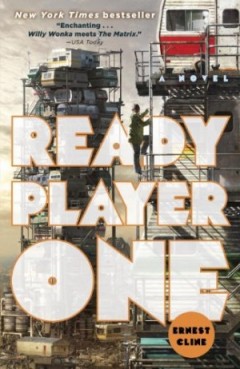Ernest Cline is a science fiction fan and video game enthusiast who, as a former tech support employee, has spent most of his working hours surfing ’80s pop culture on the internet. As an author, he has successfully drawn from these interests to write an engaging story that weaves new technology with low-tech nostalgia. Although he has previously written about the gaming world (his screenplay Thundercade follows a video gamer’s quest to restore his championship gaming title), Cline takes the concept to an exciting new level in his science fiction novel Ready Player One, Prometheus Award finalist and our June Lightmonthly Read, which offers the reader a full immersion into the world of virtual reality gaming.
Ready Player One begins in the year 2044, and protagonist Wade Watts doesn’t have much going for him in the desolate Portland Avenue Stacks. He’s an overweight, unpopular orphan living with his aunt in a crowded RV park, where the RVs are stacked up to 20 units high in an effort to accommodate everyone in an overpopulated city fraught with power outages and gunfire. Wade finds solace by playing video games and watching reruns of family sitcoms from the ’80s, trying to lose himself in a decade when the world was a simpler and friendlier place. He also spends much of his free time logged into the OASIS, a massively multiplayer online game that has evolved into a virtual reality-based global network.
The online world of OASIS is not without conflict, however. The creator of OASIS, James Halliday, died five years before without naming an heir. At his behest, a contest is being held to determine who will control the OASIS. In his video will, Halliday explains that he has hidden three keys (Copper, Jade, and Crystal) to three gates in the simulated world of the OASIS. The first person to pass through all three gates will become heir to Halliday’s multi-billion dollar estate and gain full control of the OASIS.
Desperate to find a way out of the Stacks, Wade becomes a gunter (short for “egg hunter,” a reference the Easter egg hidden in the video game Adventure). Because Halliday had an infatuation with ’80s pop culture, his death sparks a global obsessive interest; spiked hair and acid-washed jeans come back into style, and gunters attentively study the decade’s fads and trends in hopes of discovering a clue to the keys’ locations.
Wade hopes his own vast knowledge of the decade will give him an edge in the competition, but the odds are against him. He must race to find the keys before they are found by another gunter — or worse, by the Sixers, employees of the dangerous Nolan Sorrento and Innovative Online Industries, a corporation set on gaining control of OASIS at any cost.
While the plot is engaging, the most captivating aspect of the book by far is the world of the OASIS. Through the eyes of Wade’s avatar, Parzival, the reader is invited to explore the virtual world in great detail, and we are able to experience the action firsthand as Parzival travels through the OASIS in his search for the elusive keys. Many of the OASIS zones are modeled after classic video game environments, and some of the more interesting action in Ready Player One takes place in virtual reality arcades, with the characters acting out dialogue from cult classics such as the movie WarGames and trying to beating high scores on the arcade games Joust and Pac Man. The world of the OASIS is described in great detail; however, little attention is given to the relationships between the characters, and as a result they seem slightly less important than the setting itself.

While Ready Player One has many great elements, there are a few other minor problems with the story that should be pointed out. The book starts with an exciting prologue, but the first few chapters were very slow paced. Too much time passes without action, with the author writing lengthy descriptions of themes that later prove unimportant to the plot and introducing others that remain undeveloped.
A related problem is that details of the OASIS itself and various pop culture elements seem excessive at times. When considering Cline’s target audience, one wonders why explanations of avatars and chat rooms are necessary. Cline’s readers are most likely already familiar with these concepts, so this only serves to stand in the way of the enjoyment of the story.
In contrast, there were also times when the author intentionally kept information hidden, and dramatic conflicts were resolved by divulging that actions had been taken in the past that allowed the character to easily sidestep the problem. This made the resolution a bit unbelievable, almost as if a bit of cheating had taken place on the author’s end.
Because the villains in the story represent an evil corporation and there is mention of an ongoing global energy crisis and catastrophic climate change, the story seems to have a slightly leftist slant. There is a refreshing passage that states the characters’ preference for private education in the OASIS, which is funded entirely by private charity, because the public school system is “underfunded” and overcrowded.
To my dismay, however, there was nothing overtly libertarian to be found elsewhere in the story. There is virtually no government presence beyond a few minor regulations — such as those pertaining to the purchase of weapons and body armor from vending machines — but it is unclear whether the author views having so little government as a sign of progress or is using the absence of regulation to explain why there is a three-decade Great Recession taking place.
Overall, Ready Player One is a fun, exciting book that immerses the reader in instant nostalgia from the very first page. While the story isn’t without its problems, they are mostly minor and will not detract from your enjoyment of the story. You’ll enjoy the section where Parzival finds himself reenacting a scene from Monty Python’s Holy Grail. You’ll also relate to the geek archetypes found in the book. If you’re a fan of the ’80s, you’ll love finding mention of your favorite video games, movies, music, and science fiction authors throughout the book. Once you get past the slower beginning chapters, you’ll enjoy the nonstop action and find this a very hard book to put down.
















Comments on this entry are closed.
Matthew Alexander July 8, 2012 @ 9:42 pm | Link
Good review, Nickie. I think those are pretty much my feelings on the book too. 3.5/5 sounds about right.